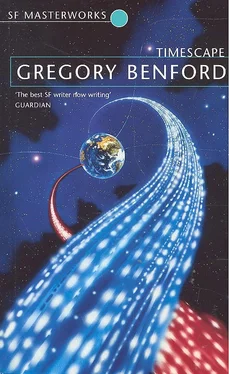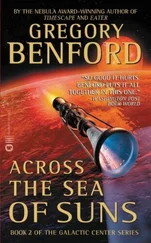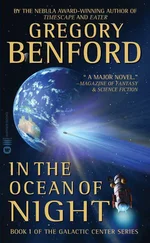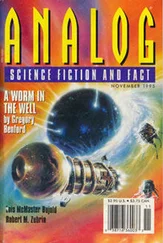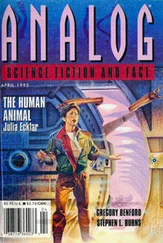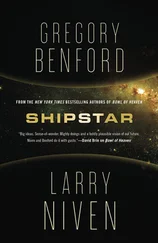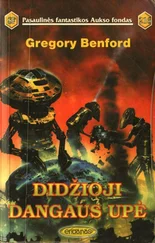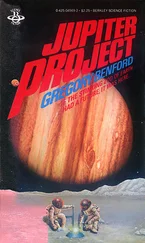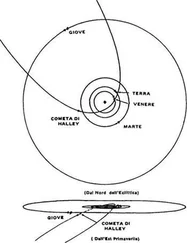“I took a lot of data,” Cooper said conversationally, ignoring the tension that had hung in the air only moments before. Gordon moved through the assembly of scopes and wheeled cabinets to where Cooper was methodically laying out the automatically recorded graphs. The paper was gridded in bright red, so that the green jiggling lines of the signal stood out, making the page almost three-dimensional from contrast.
“See?” Cooper’s thick fingers traced the green peaks and valleys. “Here’s where the indium nuclear resonance should be.”
Gordon nodded. “A nice fat peak, that’s what we should find,” he said. But there was only a chaos of narrow vertical lines, made as the recorder pen had rocked back and forth across the paper, under the action of random nudges.
“Just hash,” Cooper murmured.
“Yes,” Gordon admitted, feeling the air wheeze out of him as he said it, his shoulders sagging.
“I got these, though.” Cooper laid out another green rectangle. It showed a mixed pattern. At the right was a clean peak, its sides smooth and untroubled. But the center and left of the page was a meaningless jumble of scratchings.
“Damn,” Gordon whispered to himself. On these graphs the frequency of emissions from the indium antimonide sample increased from left to right. “The noise wipes out the high frequencies.”
“Not always.”
“Huh?”
“Here’s another try. I took it just a few minutes after that one.”
Gordon studied the third x-y output sheet. On this one there was a reasonably clear peak on the left side, at low frequencies, and then noise to the right. “I don’t get it.”
“I sure don’t either.”
“We’ve always got flat, constant noise before.”
“Yep.” Cooper looked at him blankly. Gordon was the professor here; Cooper was tossing the riddle over to him.
Gordon squinted, thinking. “We’re getting the peaks, but only part of the time.”
“That’s what it looks like.”
“Time. Time,” Gordon muttered distantly. “Hey, the pen takes about, say, thirty seconds to move across the sheet, right?”
“Well, we could change that, if you think—”
“No, no, listen,” Gordon said rapidly. “Suppose the noise isn’t always there? In this one—” he shuffled back to the second sheet “—there was some source of noise when the pen was recording the low frequencies. About ten seconds later it vanished. Here—” he planted a stubby finger on the third x-y graph “—the hash started in as the pen reached high frequencies. The noise was returning.”
Cooper wrinkled his brow. “But… I thought this was a steady state experiment. I mean, nothing changes, that’s the whole point. We keep the temperature low but constant. The scopes and amps and rectifiers are all warmed up and holding to pattern. They—”
Gordon waved him into silence. “It’s nothing we are doing. We’ve spent weeks checking the electronics; that’s not malfunctioning. No, it’s something else, that’s my point.”
“But what?”
“Something from outside. Interference.”
“How could—”
“Who knows?” Gordon said with new energy. He began his characteristic nervous pacing. His shoe soles squeaked on the floor at every turn. “What’s happening is, there’s another source of signal in the indium antimonide. Or else the indium is picking up a time-varying input from outside the lab.”
“I don’t understand.”
“Hell, I don’t either. But something’s screwing up the nuclear resonance detection. We’ve got to track it down.”
Cooper squinted at the erratic lines, as though measuring in his mind’s eye the alterations that had to be made to study the problem further. “How?”
“If we can’t remove the noise, study it. Find out what it’s coming from. Is it occurring in all the indium antimonide samples? Does it filter in from some other lab here? Or is it something new? That sort of thing.”
Cooper nodded slowly. Gordon framed a few quick circuit diagrams on the back of one of the sheets, sketching in the components with a pencil. He could see fresh possibilities now. An adjustment here, a new piece of equipment there. They could borrow some components from Lakin down the hall, and probably talk Feher out of his spectrum analyzer for a day or two. Gordon’s pencil made a small scratching sound against the background chugging of roughing pumps and the pervasive hum of the electronics, but he heard nothing. The ideas seemed to come up out of him and squeeze through the pencil onto the page, jotted down almost before he had thought them through, and he felt that he was on the track of something in this noise problem. There might be a new structure hiding behind the data like big game in a dense thicket. He was going to find out; he was sure of that.
CHAPTER FOUR

1998
GREGORY MARKHAM CYCLED PAST THE FRAGRANT buildings devoted to Veterinary Medicine and swooped into the driveway of the Cavendish Laboratory. He liked the soft brush of moist air as he arced around the curves, shifting his weight in a careful rhythm. His aim was to find a minimum curve which would deposit him at the lab entrance, a geodesic for this particular local curvature of space. One last burst of pedaling and he dismounted at a respectable speed, trotting alongside, using the bike’s energy to roll it into one of the concrete wheelstands.
He straightened his brown Irish jacket and took the steps two at a time, a habit which gave him the appearance of being always late for something. He absently pushed his glasses back up his nose, where they had worn a red mark, and combed fingers through his beard. It was a well-defined beard, following the conventional course along his sharp jaw from sideburns to moustache, but it seemed to get mussed every hour or so, as did his hair. He was puffing from the bike ride more than usual. Either he had put on some weight in the last week, he deduced, or the simple erosion of age had nicked a little deeper. He was fifty-two and kept in moderately good condition. Medical research had shown enough of a correlation between exercise and long life to keep him at it.
He pushed open the glass doors and headed for Renfrew’s laboratory. Every week or so he had come round to peer judiciously at the equipment and nod, but in truth he learned little by the visits. His interests lay in the theory behind the electronic maze. Gingerly he entered the busy ball of sound that was the lab.
He could see Renfrew through the office window—stocky, rumpled as usual, his shirt un-tucked, his mouse-brown hair falling untidily over his forehead. He was shuffling papers round on his cluttered desk. Markham did not recognize the other man. He assumed it was Peterson and was amused by the contrast between the two. Peterson’s dark hair was smoothly in place and he was expensively and elegantly tailored. He looked suave and self-confident and, thought Markham, altogether a tough bastard to deal with. Experience had taught him that it was hard to get through to that type of cool, self-contained Englishman.
He opened the office door, giving it a perfunctory knock as he did so. Both men turned towards him. Renfrew appeared relieved and jumped up, knocking a book off his desk.
“Ah, Markham, here you are,” he said unnecessarily. “This is Mr. Peterson from the Council.”
Peterson rose smoothly from his chair and extended a hand.
“How do you do, Dr. Markham.”
Markham shook his hand vigorously.
“Glad to meet you. Have you looked at John’s experiment yet?”
Читать дальше
